By Carly Blatt
There are certain types of minor travel disasters that travelers figure go with the territory: the occasional bag going missing, a lost reservation, nonstop rain at a beach resort, or a bad stomach from eating street food. For most of these, we have backup plans or can easily improvise a solution.
But for many travelers, the most significant type of travel disaster is the one for which we’re the least prepared: a natural disaster that occurs during a trip. I learned firsthand the importance of preparing for disasters while traveling when I was on vacation with a friend in New Orleans when Hurricane Katrina hit. Although no one could have been fully prepared for Katrina’s wrath, we quickly learned that as travelers we were even more in the dark about what plan of action to take.
Next time you’re planning a trip, consider putting together a basic disaster plan and disaster supply kit so you’ll be prepared if the unthinkable happens. Below, I’ve incorporated a few suggestions from the “[2] Family Disaster Plan” developed by the Federal Emergency Management Agency and the American Red Cross, as well as my own experience.
1. Prepare a disaster plan. Know what to do if you’re separated from your traveling partner. Most formal [3] disaster plans are geared for preparing for the natural disasters at home, but they can easily be altered to fit your travel needs.
2. Meeting Places. The Red Cross suggests picking two places to meet up with your traveling companions if you’re separated during an emergency. One of these can be obvious, like your hotel, but be sure to have an alternate location in case your hotel is directly affected by the disaster. Don’t forget to also pick a reliable contact back home who you each can call to check in with if you get separated. After the tsunami in Asia, many friends and families became separated and had no way to easily reconnect.
3. Communication. Even if all of your traveling companions have a cell phone, chances are the service might go down in a disaster. Also, after a disaster it’s often easier to make a long distance call than a local call. If you’re traveling solo, keep a contact back home updated on your situation so they can fill in others with the latest information. When I was in New Orleans the day before Katrina hit, I realized that cell service would soon disappear and gave my parents a list of people to keep updated since I knew I didn’t have the time – or battery juice – to call them each directly. I also discovered mass text messages were effective for quickly sending out information without wasting my battery. This only worked until the actual hurricane hit, though, when all communication came to a halt.
4. Emergency info. Have a hard copy of important phone numbers and keep it in an obvious place. Chances are, many of your frequently dialed phone numbers are carefully saved in your cell phone rather than your own memory. Which is fine until a disaster-related power outage happens and suddenly turning on your phone wastes valuable juice. A hard copy list of important numbers serves two purposes – it’s an additional resource for you, and it’s helpful in case you’re injured and someone needs to know who to call. Write “ICE” – which stands for In Case of Emergency – next to your emergency contacts. If you’re hurt, this will help English-speaking emergency personnel who are trained to look for this information know immediately how to contact the right person. FEMA has a [4] ready-made card that you can cut out and personalize. If your traveling companion has a cell phone or if you have friends in the area that you’re traveling, specify that clearly next to their names and numbers. When you’re abroad, know the number for emergency services in each country you visit.
5. Carry cash. Travelers often avoid carrying extra cash because they’re worried about theft. But if you’re stuck in a natural disaster and a power outage occurs, your ATM cards and credit cards may be completely useless. Trying to finding anyone who will exchange a traveler’s cheque during a crisis may be even more challenging. Carry change for a few phone calls in case you can find a coin-operated phone that works – land lines often continue to work when cell service goes down.
6. Learn about your surroundings. If you’re staying at a hotel or hostel, learn what their emergency plan is, if any. The Red Cross suggests determining the best escape routes and finding [5] two ways out of each room. Get to know the general area as well. If you had to leave town quickly, what are your options? How could you get to a train or bus station? Carry hard copies of a city map along with your hotel or hostel’s address with you at all times. Learn as much as you can about evacuation routes by listening to news reports and speaking with knowledgeable locals, when possible.
7. Keep important documents and extra medical supplies handy. The Red Cross suggests including special needs items such as prescription medications, extra eye glasses, and contact lens solution in your [6] Disaster Supply Kit. This is imperative if you want to stay as healthy as possible during a disaster. If you take a certain medication regularly, plan to bring double the supply, if possible, than you’ll actually need for the length of your trip. That way, if you’re stranded because of a disaster you won’t have to worry about missing doses. Also, have extra copies of your prescriptions in case you need an emergency refill. Even if you’re not able to fill them abroad, it will help give local doctors information on what you need. Keep photocopies of your itineraries, travel insurance information, passport, etc. in each of your bags. Large, clear bags are great for these, and help protect them from water.
You can read the full Disaster Supply Kit list [7] here. Keep in mind however that it’s geared toward people at home, not on the road, so you’ll need to make a few adjustments based on your particular travel situation.:
How to Survive Anything Mother Nature Throws at You
One hundred years of technological progress can be erased in minutes by nature’s fury. Recent disasters have left not only destruction, but also heroism in their wake, and we can learn from the experiences of the survivors. The right tools, skills and mind-set—the survival worldview—will help you withstand the worst.
AMS - Taking Shelter: Estimating the Safety Benefits of Tornado Safe Rooms
Over the past several decades, engineers have made significant progress in the design and construction of structures able to withstand tornadic winds and debris. The aftermath of the 3 May 1999 F5 tornado in Moore, Oklahoma, highlighted the modest market penetration of tornado shelters in metropolitan areas. The authors use historical data from Oklahoma to estimate the potential casualties that tornado shelters could prevent and calculate that the cost per fatality avoided in single-family homes is $29 million while the cost per fatality avoided for mobile homes is $2.6 million. The estimates are sensitive to the proportion of strong (F3 or stronger) tornadoes and the choice of an interest rate for present-value calculations. If the F-scale distribution of Oklahoma tornadoes resembled a reported national frequency distribution and fatalities per category storm are held constant, the permanent home cost per fatality avoided triples to $88 million. (Full Report)
Crisis Leadership: Making a Difference When Disaster Strikes
Anyone may be a "first responder" when crisis hits close to home. As a leader, how prepared are you to deal with crisis? How prepared is your organization? In this issue of Leading Effectively, we bring you lessons of leadership from people who made a difference when Hurricane Katrina hit Mississippi and Louisiana on August 29, 2005. While few of us may be called to lead in a crisis of the magnitude of Katrina, we will all almost certainly face significant and unexpected crises in our work and lives. Our ability to be effective in a crisis can fundamentally shape the course of our lives after the crisis. What can we learn from a crisis like Katrina about being better prepared?
The "Crisis Leadership: Lessons from the Frontlines" forum was made possible by a gift from the Marrow family to encourage the Center to facilitate conversations about important leadership issues.
Severe Storm Conferences
TESSA
The Texas Severe Storms Association
2008 National Storm Conference Agenda
MARITIME NOTES
Bosphorus Channel Remains Closed Due to Bad Weather
The Bosporus shipping channel between the Mediterranean and the Black Sea is still closed, a source at the Master Maritime Agency, which provides transit services in the area.
"The Bosporus Strait was shut on Saturday because of bad weather," the source said. "It has remained closed since and we are not sure when it will reopen." Transit through the Turkish Straits as a whole (both the Dardanelles and Bosporus) was reported to be delayed by nine days on Friday, but early Monday morning the closure had increased the estimated delay to around 10 days.
According to Mastership there were were presently 12 northbound and 10 southbound tankers awaiting or expected for transit through the Bosporus. The most recent passage had been on Saturday when three northbound tankers managed transits before the closure.
Due to ongoing work on the Marmaray underwater tunnel, traffic through the strait is only permitted in one direction at a time and tankers may only pass through the Bosporus between 06:00 and 16:00 local time (04:00-14:00
GMT).
However, the Dardanelles Strait, which makes up the southern portion of the Turkish Straits, separated from the Bosporus by the Sea of Marmar, remained open to shipping, the agent confirmed. Here delays were much shorter with six northbound tankers waiting for passage and no southbound tankers either waiting or expected.
USA. Lloyd's Register Educational Trust announces Maritime Technology Student Award in North America
Monday, 18 February 2008The Lloyd's Register Educational Trust (LRET) has signed an agreement with the Society of Naval Architects and Marine Engineers (SNAME) in the United States of America to sponsor a Maritime Technology Student of the Year competition and award in North America. Designed to highlight excellence, the award will encourage students to showcase their research and investigative studies on various topics in the areas of naval architecture and marine engineering and promote leadership in the industry.
The 'Lloyd's Register Educational Trust Maritime Technology Student of the Year Award' is a collaborative effort between SNAME, which is dedicated to advancing the art, science, and practice of naval architecture, shipbuilding, and marine engineering,and the LRET, which supports science, engineering, and technical education programs worldwide. The award is based on an existing scheme that the LRET has funded in the UK for ten years.
"The success of students in this field of study will be vitally important to the maritime industry as they apply engineering and science to design, build, and operate the huge variety of vessels and structures on or under the sea's surface," says Michael Franklin, LRET Director. "The Lloyd's Register Educational Trust is very pleased to further its commitment to improving the quality and safety of the maritime industry worldwide by sponsoring this award."
"We believe it is essential to encourage, inspire, and recognize the work of young men and women who have chosen naval architecture or marine engineering as their course of study," says SNAME's Executive Director, Phil Kimball. "We are delighted that the Lloyd's Register Educational Trust has chosen to work with us on this prestigious award."
The competition is open to undergraduates at academic institutions throughout the US and Canada that offer programs in naval architecture and marine engineering, and provides a cash award to a first and second place winner selected by a judging panel of industry experts.
Monday 18 February 2008 11:48
Maritime And Coastguard Agency (National)
The Ro Ro ferry 6,041 ton `Riverdance' still remains firmly aground on the North Shore at Blackpool. The vessel still remains in a precarious position. Currently the vessel is maintaining a significant list to starboard. The main cargo deck, lower hold, engine room and steering gear room are currently interconnected and therefore flood with the tide and the watertight integrity of the hull is subject to further investigation by salvors.
The salvage control unit, chaired by Hugh Shaw, the Secretary of States Representative in Maritime Salvage and Intervention (SOSREP) recently reported that over the past weekend all bunker fuels have been successfully removed from the most vulnerable tanks. Operations will now concentrate on stabilising the vessel by making the hull watertight and transferring water ballast to reduce the list. The severe list has made the access to the double bottom tanks much easier and safer than before.
Work continues on the further removal of a number of trailers from the main deck, but efforts are being hampered by the tide levels at low water which is restricting the safe working time on scene. The Environment Group continues to monitor and risk assess the situation and are satisfied with the progress being made to date.
Additional security staff remain in place to cover the 'low water' periods supported by HM Coastguard personnel and vehicles when the vessel presents dangers to onlookers who stray too close the site.
An outline traffic management plan is being discussed between Lancashire Police and the local authorities for the refloating operation which, due to ongoing work on board the vessel, will not take place for at least the next two weeks. A number of road closures and restrictions will be put in place at that time and the plan will be implemented for the period covering the refloat.









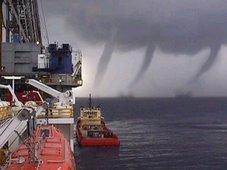
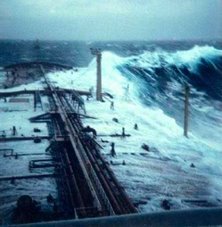
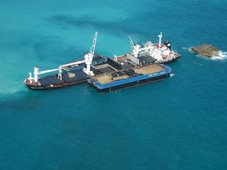
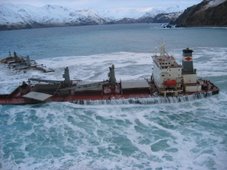
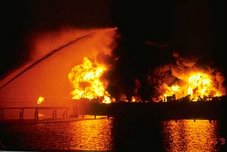
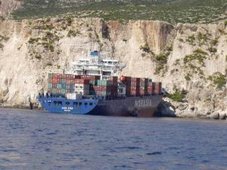


![Validate my RSS feed [Valid RSS]](valid-rss.png)
No comments:
Post a Comment